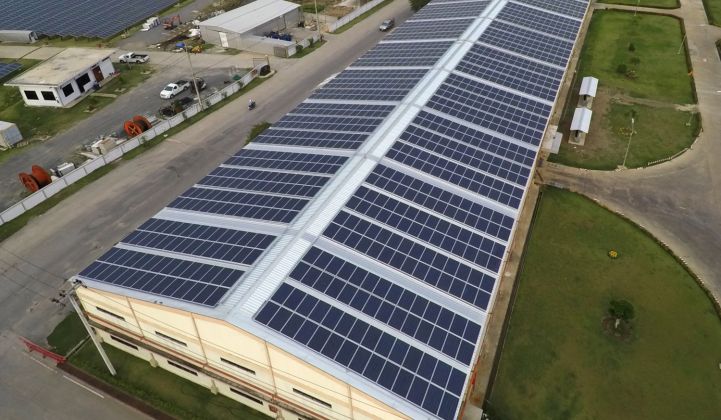Centrica, a massive British multinational energy and services firm with $36 billion in 2017 revenues, just acquired Vista Solar, a small solar EPC based in California that serves commercial, institutional and industrial customers. Vista has more than 160 commercial clients and has installed more than 40 megawatts of solar. The deal price was undisclosed.
Although a relatively modest deal, it's illustrative of a broader change in the utility business and the way energy is used in the enterprise.
"Centrica’s acquisition is very much in line with the recent trend of strategic investors taking on more increasingly early-stage development risk," said Wood Mackenzie Senior Solar Analyst Michelle Davis.
Vista Solar installed 3.5 percent of California’s commercial solar installations in the first half of 2018, making it the 22nd ranked installer in the state, according to Davis. Vista has installed a few megawatts a year for the last several years, according to GTM's U.S. PV Leaderboard. Last year, Vista installed 6 megawatts.
A "secular change" in energy
North Americans might be more familiar with Centrica's retail energy arm, Direct Energy and its more than 4 million customers in the U.S. and western Canada. It was Centrica Business Solutions, the conglomerate's new C&I business unit, that acquired Vista Solar. According to earlier reporting by GTM's Jeff St. John, Centrica Business Solutions now has the capability to offer combined heat and power, distributed solar, energy storage and standby generators, "along with the software and services to put them to use."
The new C&I business is backed by the potential of $910 million in additional investment by its parent company through 2020.
This is far from Centrica's first acquisition in the sector. The firm acquired Panoramic Power for $60 million in 2015, a maker of wireless sensors that collect and analyze data from a building’s circuit panel. Rudox Power Generation, a provider of CHP systems and backup generators, was bought by Centrica for $212 million in 2016. Belgium's REstore, which Centrica bought for $81 million in 2016, controls building energy.
And the acquisition spree is not over.
"We are going to buy more businesses. We're already in discussions," said Stephen Prince, head of Centrica Business Solutions for North America, in an interview. This is driven by the "secular change" in energy — away from central power to distributed energy that can be controlled by the customer.
Volumetric sale of kilowatt-hours of electricity is not going to be a high-growth market, said Prince. But being able to provide customer energy solutions lets Centrica generate more revenue and more value. "We can do better than just a commodity," he said.
Prince pointed out that selling solar is no longer enough: "You have to sell solar and storage. The nature of the solution is becoming more and more complex." Customers are not looking for power; they are looking for "quality power."
In almost every discussion Prince has had with clients, energy diversity and resiliency "trump sustainability."
"We have to change to keep the customer satisfied"
According to a study commissioned by Centrica that reached over 1,000 energy decision-makers in large organizations across six countries, "energy is moving up the agenda at organizations across every sector." Eighty percent of businesses globally believe that a quarter of energy needs will be generated onsite by 2025, according to the Energy Advantage Report.
The study found that energy security and resilience ranks second as a business risk, behind only cybercrime. Almost half of healthcare organizations have instituted measures to improve energy resilience and control. One-fifth of manufacturers have already implemented wireless power sensors and analytics to gain better insight and control. Manufacturing industries and hospitals continue to be interested in CHP.
Business needs are changing, and "we have to change to keep the customer satisfied," said Prince.
Energy services acquisition roundup
Centrica is among a number of European energy providers going after the North American distributed energy market. Energy giants such as Enel and Engie have amassed their own portfolio of distributed solar, energy storage, energy software, backup generation, demand response, and other grid edge capabilities.
Italian power giant Enel acquired demand response firm EnerNOC and battery storage specialist Demand Energy. EnerNOC, in turn, bought EV charging startup eMotorWerks.
Shell New Energies has been busy acquiring or investing in grid edge companies such as thermal storage firm Axiom Energy, microgrid company GI Energy and residential energy retailer Inspire Energy. Royal Dutch Shell bought MP2 Energy, a Texas-based developer of wind, PV and gas projects.
Engie, the services arm of GDF Suez, has a majority stake in behind-the-meter battery startup Green Charge Networks.
French mega-utility EDF bought Groom Energy Solutions through a subsidiary last year, launching its own C&I distributed energy business. EDF subsidiary Dalkia acquired CHP player Aegis Energy Services.
Geothermal power giant Ormat acquired Viridity. Power plant engineering firm Wartsila bought Greensmith. And Aggreko bought energy storage firm Younicos.
This is a test
If an energy provider like Centrica is looking to win in the C&I energy services business, servicing all of the energy needs for the enterprise, then owning a solar EPC makes absolute sense. Centrica now has its own EPC resources, allowing the firm to "streamline project development processes under one roof," according to GTM's Davis.
Many other global utilities and energy providers are making parallel business moves.
But as Ben Kellison, director of grid research at GTM, has noted, “There have not been enough instances of combined services contracts with C&I customers to definitively show that this is the model and the time to secure significant, replicable business. It is, however, a great way to buy many low-cost businesses to test what combinations of services become successful."




